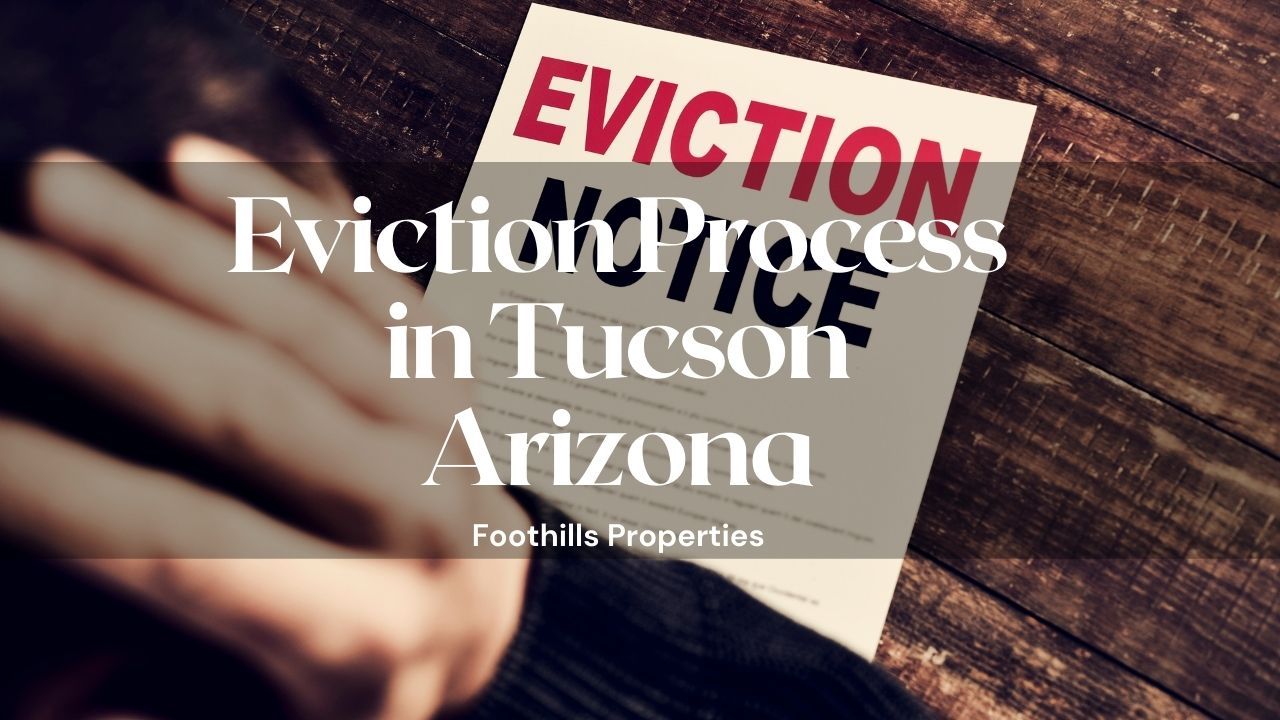
First and foremost, evicting a tenant is inevitable in any landlord’s career. As a landlord in Tucson, a landlord can initiate an eviction hearing and evict a tenant for a number of reasons under Arizona law.
These include nonpayment of rent, rental or lease agreement violation, or engaging in criminal activities within the property.
During a tenant eviction process, you must follow the due Arizona eviction process as laid out under Arizona law, just like breaking a lease.
Even if a tenant violates the rental agreement, you can't use “self-help” means to evict them. Examples of “self-help” tactics include:
Ordering your tenant to leave
Harassing or threatening your tenant
Removing your tenant’s belongings from their rental
Changing the locks
Cutting off previously available utilities
Slandering false rumors about your tenant
Ignoring your tenant’s frequent maintenance requests
Interfering with the tenant’s use of their unit
All these actions are illegal and will cause a nightmare for a landlord under the Arizona eviction laws.
Now, Arizona laws are landlord-friendly. In other words, Arizona has a legal environment that favors landlords. As such, the eviction process in Arizona, which begins with filing an eviction complaint, can be smoother, allowing landlords to more efficiently navigate the legal steps.
The following is a basic overview of the Eviction Process in Tucson, Arizona.
Step#1: Grounds for the Eviction
The Arizona evictions process is regulated by the Arizona Residential Landlord and Tenant Act. As a landlord, it’s important to follow the entire eviction process contained in this act when evicting a tenant.
The following are common reasons for evicting a tenant:
Failure to pay rent. Non payment of rent is a serious lease or rental agreement violation. A tenant has an obligation to make a monthly rental payment to the landlord. So, if your tenant fails to make the rental payment, you can begin formal proceedings against them.

Failure to maintain the unit. A Landlord can evict your tenant for failing to keep their rented premises to acceptable standards, especially if their negligence is affecting the safety or health of other tenants living in the rental unit. These examples include when a tenant violates acceptable building codes, willfully destroying parts of the property, and not disposing of garbage. You can also keep the security deposit, in this case.
Violating the lease or rental agreement. Common lease agreement violation instances include having unauthorized pets or even lying on the rental application, and hence the landlord files an eviction lawsuit, which leads to a court date.
Step#2: Posting the Eviction Notice
The landlord must ensure the notice to file an eviction complaint is relevant to the violation committed. For example, in the case of nonpayment of rent, the landlord must serve the tenant with a 5-Day Notice to Pay.
The eviction notice says that if the tenant pays the owed rent, then the landlord’s eviction will be voided. Otherwise, they have to leave the rental unit.
If the tenant does neither after the written eviction notice, the landlord may proceed with their eviction in court. If the tenant continues to refuse, the landlord will need to attend court for the final decision.
Besides the 5-Day Notice to Pay the rent the tenant owes, here are other ways to give a tenant proper types in the state of Arizona:
10-Day Notice to Comply. This written notice is specifically meant for violations to the lease or rental agreement. Typical lease violations under this category include having an unauthorized pet, exceeding the rental limit and causing excessive damage.
10-Day Notice to Quit. You must use this when evicting a holdover tenant who is making rental payment on a weekly basis. That is, a tenant who has refused to move out after their lease term has ended. It basically gives the tenant only 10 days tno vacate the premises on the notice period.
.jpg)
30-Day Notice to Quit. This is also meant for holdover tenants. However, in this case, it’s meant for tenants renting on a monthly basis. Again, the only option the tenant has is to leave after the notice period.
5-Day Notice to Comply. A landlord can also evict a tenant for violating a safety, building, health, or housing code. The 5-Day written notice to Comply gives the tenant five days to “cure” the violation.
And, of course, you can evict a tenant for committing an illegal activity. Examples of illegal activities include assault, prostitution, homicide, causing nuisance or threatening someone.
Step #3: Filing & Serving the Complaint
This is the next step when you file an eviction. Filing usually costs about $35 in a justice court and $218 in a superior court.
In the state of Arizona, the summons must be issued on the same day the complaint is filed to evict tenants. The service to the tenant must be done 2 days prior to the hearing via registered or certified mail server.
Step #4: Hearing & Judgment
Once the summons is served, the eviction hearing must occur within a period of 6 days. Court costs are at the expense of involved parties that is both the landlord and tenant. After the court costs settlement, the tenant can choose to file a written answer. This isn’t, however, required. If they do, the tenant can present any of the following defenses to the judge in court:
You used an illegal eviction procedure. As per ARS § 33-1367, it’s illegal for a landlord to use an unlawful procedure. They can’t, for example, lock the tenant out of the unit or shut off utilities. If you use an eviction process that is against the law, you risk being liable for monetary damages.

You failed to use the proper procedure for the lawsuit. As an Arizona residential landlord, you must follow all rules stipulated under the Arizona RLTA for the eviction action. For example, failing to serve the proper notice on the tenant falls under this category.
You tried to evict the tenant for exercising one of their rights. As a landlord, you’re responsible for providing a habitable unit. If a landlord fails to do this, especially after repeated requests to fix the issue, a tenant can choose to exercise their right to “deduct and repair.” You can't use the fact that they haven't paid rent as a justification to evict them.
The lawsuit is based on discrimination. The Fair Housing Act makes it illegal for landlords to discriminate against their tenants based on protected characteristics. The characteristics include gender, religion, race, disability, familial status, and national origin.
Step #5: Judgment for Possession
There are two ways in which the judge can rule in landlord's favor after the court hearing and the landlord wins: one, if the tenant does not answer the complaint. In such a case, the court and judge will probably issue a default judgment. Or two, if the court finds merit in your submission.
In either case, the court will issue, upon your request, a writ of restitution. This is a legal document that gives the possession of the unit back to the landlord after the landlord wins the eviction judgment. The tenant will then have anywhere between 12 hours and 5 days to leave the property prior to being evicted.
Do you need professional help removing a tenant from your Tucson rental and carrying out an eviction? If so, Foothills Properties can help! Get in touch with us today.
*Disclaimer: The information herein is meant to be informational, not legal advice. It is in no way a substitute for competent legal counsel licensed in your area.








